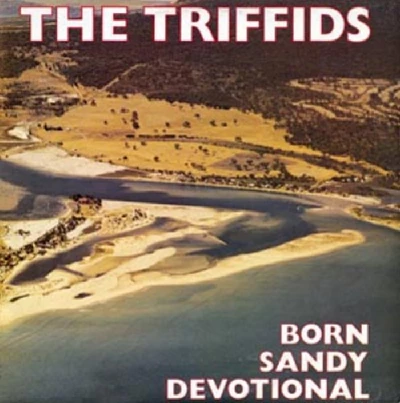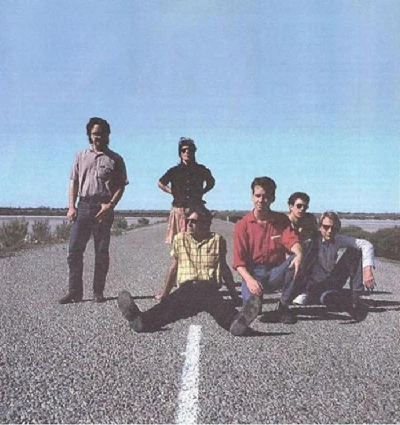Triffids
-
Born Sandy Devotional
published: 16 /
4 /
2006

In the latest in our 'Re : View' series, in which our writers re-examine albums from the past, John Clarkson looks at Australian group the Triffids' haunting 1986 masterpiece 'Born Sandy Devotional', which has just been reissued
Article
It has sometimes been said that you have to leave where you came from in order to write about it.
The ill-fated Australian group the Triffids, who were from the isolated Western city of Perth, recorded both their first two albums, ‘Treeless Plain’(1983) and ‘Raining Pleasure’ (1984) in their native Australia. It was, however, to London and the busy suburb of Farringdon that David McComb (vocals, guitar, keyboards) ; his brother Robert McComb (violin, guitar) ; Jill Birt (keyboards, vocals) ; Martyn Casey (bass guitar) ; Alsy MacDonald (drums) and new recruit Graham Lee (pedal and lap steel guitar) came to record their third album, ‘Born Sandy Devotional', in the summer of 1985.
The Triffids would go on to record another three studio albums, ‘In the Pines’ (1986), ‘Calenture’ (1987) and ‘The Black Swan’ (1989) and a live record ‘Stockholm’ (1990) before they broke up in relative obscurity, disappointed at their lack of commercial success, It was ‘Born Sandy Devotional’ though, which came out originally in 1986 and has just been re-released with extra tracks on Domino, the first in a string of Triffids re-releases over the next year, that was to prove their defining moment and masterpiece.
An album which has moments of the Byrds, the Velvet Underground, Nick Drake and fellow Australians the Birthday Party, yet which also encapsulates also something totally unique and of its own, ‘Born Sandy Devotional’ is engrained in lonely atmospherics.
David McComb’s tortured, theatrical vocals; his brother’s churning violin, Birt’s swirling keyboards, Lee’s spooky pedal and lap steel and Casey and MacDonald’s hazy, often sinister backings collectively fuse together country, folk , ambient and punk sounds and create a pervading sense of haunting desolation.
‘Born Sandy Devotional’ is an album of the elements. The sand, hot sunlight that bores into the ground and burns feet , and long, empty landscapes and passages of road all have significant parts to play as David McComb’s characters struggle and sometimes fail to survive in the wilderness. It main theme, however, is that of unrequited love.
The opening track ‘The Seabirds’ starts abruptly without any musical introduction and with McComb’s lyric. One of the darkest songs ever recorded, the rest of it proves to be similarly unsettling. The band’s surging and epic orchestrations set a tone for the rest of the album, combining the panoramic with the insular and claustrophobic as McComb’s hapless protagonist, his marriage in tatters and after a night of failed sex in a cheap motel room with a unsympathetic, taunting stranger, decides to swim out into the ocean where, his body cut and bruised, he hopes the hungry and vicious seabirds will feed on him. (“There was no one left to hold him back/no one to call out his name/dress him feed him drive him home”).
In an especially cruel twist of fate and humiliation he is, however, not allowed to die and forced to face a living agony which is possibly even worse. (“They could pick the eye from any dying thing that lay within their reach, but they would not touch the solitary figure lying tossed up on the beach.”)
Suicide is also the focus of the chilling ‘Tarrilup Bridge’. Eerie vibraphone effects from guest player Chris Abrahams merge with jarring instrumentation from the rest of the group and one of two rare vocal appearances on ‘Born Sandy Devotional’ from Jill Birt, who plays with glacial blankness the part of a failed actress, abandoned by her lover and who signs herself off from life, the casualty of a broken heart. (“I packed my bag/Left a note on the fridge/And I drove off the end of the Tarrilup Bridge.”)
Both the middle songs on the ten track ‘Born Sandy Devotional’ are set in the wilds of the plains. The two main characters of the raging storm-and-thunder of ‘Lonely Stretch’ and the elegiac, wistful ‘Wide Open Road’ have both become stranded in the desert and each has lost someone.
The protagonist of ‘Lonely Stretch’, love sick after the collapse of his romance, has taken a symbolic wrong turning and become helplessly lost in the wilderness. His relationship was a mess (“We were two wrongs, we were married at birth/And together make up an ugly flaming bird”), but, as he feverishly drives on, becoming further and further adrift and mentally unhinged in the torrid landscape, he hopelessly dreams of winning his lover back. (“Now my memory’s shot I’ve got a bad technique/Could be driving in circles till the end of the week/But my vision is strong, and my vision is true/Look out now ! I’ll be so good for you”)
“You could die out here from a broken heart” howls David McComb at one point on ‘Lonely Stretch’, capturing in just one line the sense of heat and dust that seeps through so much of ‘Born Sandy Devotional’, and the anguish and agony of all its central characters.
The main character of ‘Wide Open Road’ is in similar pain at the termination of his relationship (“How do you think it feels sleeping by yourself ?/When the one you love, the one you love, is with someone else”), but in contrast is able to look beyond it and with some hope and optimism to the future (“It’s a wide open road/And now you can go to any place/that you ever wanted to go”).
Lastly, there is the final track, the achingly beautiful ‘Tender is the Night (The Long Fidelity)’, another song to start straight with the verse, and the second to feature Jill Birt on lead vocals. Her little-girl-lost vocals recall those of Moe Tucker on ‘After Hours’, the last song on ‘The Velvet Underground’, as, lonely and hurt, and flinging herself at someone else equally damaged, she is unable to shake memories of her past love, who has left her to go and live without explanation in another country (“It’s getting dark earlier now/But where you are it’s just getting light/Where you are it will just be getting light”).
Alsy MacDonald said in a retrospective 1999 interview that, much like McComb’s beloved Velvet Underground, he believed that David McComb and the Triffids would only receive real recognition in the future. The Domino reissue programme will hopefully be the beginning of that.
Whatever the outcome of it , David McComb has not, however, lived to see it. As tormented as many of the characters he wrote about, he suffered increasing ill health problems throughout the 1990’s, and underwent a heart transplant in 1996. He died at home on February 3rd 1999, two days after being released from hospital having been involved in a car crash and a fortnight short of his 37th birthday.
‘Born Sandy Devotional’, with its tales of doomed and lost love, is a still to-date largely unheard masterwork. It provides an abiding legacy and a rich epitaph.
Track Listing:-
Picture Gallery:-

Visitor Comments:-
|
|
2702 Posted By: Vincent, Melbourne Australia on 22 Jul 2022 |
Thanks for helping keep the Triffids accessible to an audience.
|